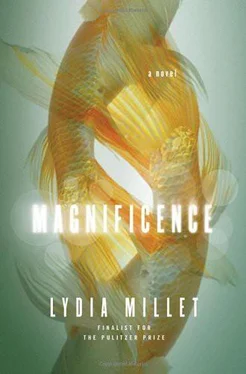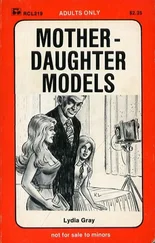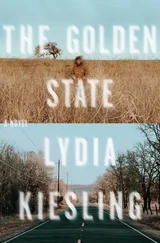“My what?”
“Angel’s-trumpet. The white flowers?”
Susan looked at them — large, drooping conical blooms, languid on their thick tussock of leaves.
“All things considered, I suggest you sacrifice this.”
They watched the backhoe rip out half the sprawling rhododendron, dragging a tangle of severed branches behind it. By the time it had reached the area of the manhole it had left a swath of destruction in its wake — torn-up limbs and grasses, red-brown earth exposed beneath the stripped-up turf. She felt a stab of guilt and worry for the plants, for the disturbed symmetry.
All for a poorly placed manhole, which, for all she knew, covered nothing but an ancient septic tank — she was deluding herself. The aging women, their absent-mindedness and dementia: by osmosis she was becoming more and more like them. Or maybe, in her own aging, here at the tail end of her forties, she had drawn these women to her. But more likely they had drawn her to them via some kind of post-menopausal force. When young women lived together, after all, or even stayed for a time in the same area, their periods grew to coincide — the pull of pheromones, legend had it. Possibly this was like that, minus fertility. The other end of the life cycle: contagious senility. Because she was less rational with each day that passed, less grounded. Wasn’t she? More closely tied to the place, but less closely tied to herself. . she felt a quick, deep regret.
Once she had been pragmatic: once, when she was a younger person, she’d passed for normal on a daily basis. She’d been a teacher after all, first grade, second grade. She had personally been a trusted guide for children, had led them up to the new and tried to help them decipher it. She had felt the newness herself now and then — felt for an instant, as she showed them a simple picture of an apple, that she herself had never seen an apple before — never in two dimensions, never so flat. And so perfect.
In that instant she had a glimpse over the wall of a garden.
And society had let her do this, had even thanked her for it. Society had deemed her fully responsible, a shepherd of the dear flock. There had been small teaching awards; there had been offers of dull administrative positions as a reward for her years of service. The children had often loved her, the parents had smiled and thanked her profusely and the mothers brought her generic female gifts, soap or scented candles. Now — much of the time alone, far, far away from those glowing children — she roamed a big, dim mansion whose walls were lined with dead animals, herself growing old, surrounded by dust and fur, by remnants of fierceness, remnants of wildness, remnants of what had once been the world.
The old women weren’t dying quite yet but they were feeble and growing paler all the time, pale speech, pale minds, pale hair, pale skin. As the youth fell away they also shed the pigment, they shed every last vestige of youthful color. . maybe that was why old women often wore clothes in garish hues. She forgot what the theories were about aging — cells failing to divide, cells dividing too fast. But however the molecules were getting it done, the women themselves were fading, lost to entropy and washing out. They went gray, grayer, white, toward the day in the future when they attained translucence. And so the reds, the violets, the pinks and emerald greens they wore were a desperate grab at pigment again, a simulation of life.
She was filled with longing. She knew what it was. She recognized it instantly. She wanted the small children back.
Yes, it was sentimental — it was pathetic, this yearning. But they were good; they were, almost always, so good. She missed their perfect skin — their beauty, the swiftly given trust. She wanted to see them again. She wanted them all around her. How had she ever let them go? Children! Come back. Come back now, dears, you dear beings. When I left, you know, I was only joking — a foolish joke, wasn’t it. I wouldn’t leave you. I’m here again.
When had this happened? Not with Hal’s death. Not with his death — long before that. It happened with the accident. She had turned from the children because of a terrible certainty, a certainty of what was coming.
“Are you all right, Susan?”
She realized the backhoe driver was staring. He wore a tie-dyed T-shirt with large underarm stains.
“Why don’t we let the gentleman begin his excavation,” went on Portia. “I’d like to go inside for a few minutes and check up on the ladies.” She tapped Susan’s arm and they turned back toward the pool and the tennis court. Tie-dye, Susan thought, was limited in its appeal to those who were dropping acid. No one in a sober frame of mind could possibly find it pleasing to the eye — though possibly the old women admired it for its garishness.
“Go inside,” she echoed, and nodded.
“You know: Ellen has to take her hypertension pills. I don’t like to leave it to Angela. Angela doesn’t run on a schedule and so she tends to forget.”
Portia must only be here to manage the others, Susan realized as they picked their way along the flagstones — or to ensure, rather, that Angela did not mismanage them. . she must see that as her duty, watching over the frailer ones.
Herself, she was seeing how all those years had been, falling behind her in ripples, fading. In a rush she heard what Hal had said to her on the telephone from Belize. He was sorry for forgetting her, he said, so taken up with Casey, and he regretted that, regretted leaving her alone. It was true that she had often been alone, but not always; and she had left him too, obviously, for the theater of other men and the straining distraction of vanity. But that wasn’t what gripped her now, that wasn’t a new recognition. She had left the children also, when she turned from teaching to the coldness and orderliness of what she did now, the procedural neutrality of office work. She had decided to be anonymous in her public life and flagrant in privacy — anonymous except to the few people she selected. She chose the sly exhibitionism of her new slut vocation and turned away from the openness that she used to have, once, with children.
Not their openness but her own. That was what was missing.
She had left them behind because she was a coward. It was clear. Only a fool could have missed it.
She had missed it herself and so she must be a fool — or if not a fool, then a person without self-awareness, though she’d always flattered herself otherwise. But there it was: she had looked at her little first graders and seen Casey and seen, after childhood, everything else that would happen to them. Everything that could, and would, and never — not even at the furthest limit of possibility — the single thing that should, that they should remain this way forever, the way of being children, the way of eagerness, sweetness and hope. The hope she used to have for them, the warm hope you had to have for each child once you had a child yourself, was lifted like a thin veil and replaced with cold certainty: they would feel pain and die, some of them before they even found out who they were. Others would soldier on and meet defeat in everything they did, the joy of that first thrill of life falling away, disintegrating. She saw them in their futures, pitted and bowed down.
This was what Hal had known, how she had been captured by dread. He hadn’t known the other part, how she pursued a certain state of being known — sex as a form of fame, wanting to be instilled in other people’s memories. She’d wanted to make herself stay with them, an image in a great hall of figures. She’d thought she would live more that way. But Hal had known she was running, in the end he’d seen: in the fell swoop of the accident she’d been gripped with a fear of children, of them and for them. The sadness of the future had dazzled her. She turned her face away.
Читать дальше












